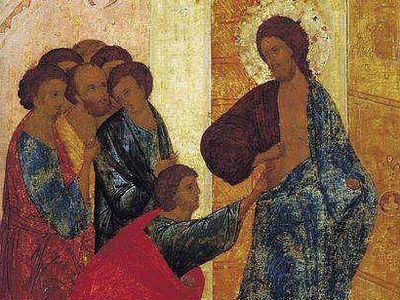
Once, as the rector of the church in the name of the Apostle Thomas, I happened to hear such a conversation: “This church is abnormal—only unbelievers come here. That’s why it’s named in honor of Thomas the unbeliever!” It’s just a little anecdote, but it causes many to wonder, who is this “unbelieving” apostle?
The Lord Jesus Christ chose for Himself twelve men to be His closest disciples. By His commission the apostles founded the first Christian communities and led the Church. One of these twelve was Thomas.
The touch of Divine might does not break the human personality. After turning to Christ the same character and temperament which were given to him at birth remain with a man, but in the meantime all his personal qualities simply blossom by contact with the Lord’s life. Thomas, apparently, was by nature skeptical and stubborn, and these qualities especially manifested themselves in his ministry. For example, during the earthly life of the Savior, when all the apostles feared to go to Jerusalem, where Christ was threatened with punishment, Thomas simply said: Let us also go, that we may die with Him (Jn. 11:16). And now the obstinacy of a Christian often turns into steadfastness and is connected with a peculiar bravery.
When the Lord appeared to His disciples for the first time after His Resurrection, for some reason Thomas was not with them. When the other apostles told him of the Resurrection of Christ, the “unbelieving” apostle said: Except I shall see in his hands the print of the nails, and put my finger into the print of the nails, and thrust my hand into his side, I will not believe (Jn. 20:25). It turned out to be quite difficult to accept the news about the victory over death even for those who saw Christ face to face and learned from Him. But Thomas was honest in his doubts and didn’t feign to believe. Surely his brethren tried to convince him, but he remained firm—he needed to personally make sure that Christ was risen.
 Fr. Daniel Sisoyev
Fr. Daniel Sisoyev
Paradoxically Thomas’ disbelief only emphasizes the faith of the apostle and helps us to believe. This disbelief only confirms for us the fact of Christ’s victory over death. Now we know that we die not forever, that we do not need to fear the grave. Its predatory mouth will release all its prisoners, for God has promised us eternal life in the flesh. And it’s not simply a promise, for Christ, the Firstborn of the dead, is already risen, to carry out from the grave with Him all of mankind.



